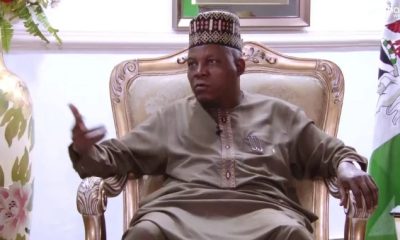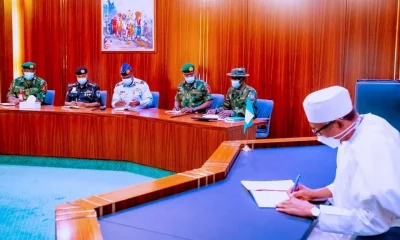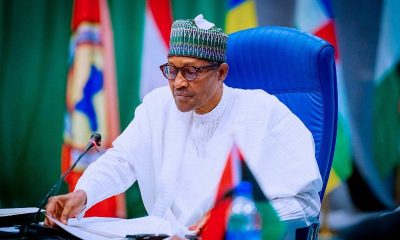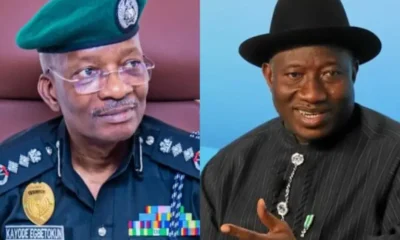Headline
SHOCKER: How Buhari’s Directive On Police Salary Review Was Flouted 3 Times
Published
2 years agoon
By
Editor
It is unbelievable! A policeman in Nigeria, in the course of performing his duty, risks his life every day but at the end of the month, his salary is nothing to write home about. The remuneration of the personnel of the Nigeria Police is not only scandalous but also very embarrassing. Yet, the Nigerian public expects so much from the police.
Last Tuesday, the Minister of Police Affairs, Mohammed Dingyadi said that a new salary package was underway for the officers and men of the Nigeria Police. He explained during a session of 2022 budget defence with the Joint National Assembly Committee on Police Affairs that President Muhammadu Buhari has directed the Salaries and Wages Commission to work out the package and submit it to the government for consideration.
According to him, “in recognition of the take-home pay of the police which necessitated the need to motivate them for better performance, the President directed the Salaries and Wages Commission to work out a new salary package for the Nigerian Police and submit it to the government for consideration. In keeping with this directive, the Commission in consultation with the relevant stakeholders has submitted a proposal to the government which is being given the desired and urgent attention.”
The minister’s announcement, however, may not excite the Nigeria police because President Buhari’s directive for upward review of police salary had been flouted three times by the appropriate office.
In a move to improve their welfare, President Muhammadu Buhari, on three occasions directed the review of police salary. Surprisingly, policemen who spoke with Saturday Vanguard disclosed that this directive had not been carried out.
The first time was in 2018 when the president disclosed his approval of a new salary package for police personnel, during an audience in the State House, Abuja, with members of the Nigeria Police Service Commission and the leadership of the Nigeria Police Force on a “Thank You” visit.
READ ALSO: Threats To Nigeria’s Corporate Existence unprecedented, Osinbajo Laments
The visit followed his approval of Rank Salary Structure Adjustment, by which salary, allowances and pension of police officers would be increased.
The second instance was last year. This followed a directive to that effect by the Presidency, in compliance with one of the demands of the EndSARS protesters.
A top official of the National Salaries and Wages Commission, NSWC the federal government agency that determines salaries and allowances of its workers, disclosed to Vanguard that it had commenced the review of salaries and allowances of the nation’s police personnel.
In June 2021, the President, during his one day visit to Lagos where he inaugurated various projects, disclosed that he had directed the upward review of Police salaries and benefits.
He was quoted as saying, “I have directed the National Salaries, Incomes and Wages Commission to carry out an upward review of Police salaries and benefits. We are currently recruiting 10,000 new police officers to reinforce our personnel capacity across the country.”
President Buhari said that no government since 1999, had been as committed as his administration in reforming and repositioning the Nigeria Police Force and national policing architecture.
But investigation revealed that the president’s directive had not been carried out. Findings revealed that what some policemen got as salary review was an increment between 2,000 and 25,000 difference.
The Nigeria Police is the principal law enforcement and lead security agency in Nigeria was founded in 1820. It kicked off with the strength of a 1,200 member armed paramilitary, when the Hausa Constabulary was formed in 1876, to when the northern and southern regional Police forces were later merged in 1930, to form the colony’s first national police – the Nigeria Police Force.
Sadly, with the prevailing spate of insecurity in the country and wanton killings of Nigerians in the six geopolitical zones, there are glaring pointers that the Nigeria Police may be gradually losing grips of its constitutional responsibility of providing internal security.
Various strategies have been applied by the Police to tackle insecurity in the country. But these strategies staggered midway, owing to prevailing challenges beyond the handling of policemen and women.
Standard operation
One of these challenges is the standard of operation. It is a sad reality that policemen in Nigeria operate under the most nerve-racking and heart-rending experience in the world.
For instance, the Nigeria Police Force is bereft of modern-day technology to combat crime. While other countries in the world are using polygraph tests, otherwise known as lie detectors, to detect deception by evaluating message content as well as a non-verbal clue, our policemen still resort to its analogue method of torture most times, to extract the truth from suspects.
Another modern-day equipment to detect crime is the use of a mobile phone tracking device, which is used to identify the location of a mobile phone, whether stationary or moving.
Although the Nigeria Police Force acquired these devices, the distribution was limited to its tactical units. This helped in the arrest of kidnap and robbery suspects involved in high profile abductions. Some of these suspects were tracked to their enclaves in thick forests, creeks, waterside and even outside Nigeria.
Unfortunately, this device has been inactive for several months, as the NPF is said to be owing several millions of naira for its reactivation.
At the moment, the lead security agency relies on the Department of State Service, DSS for the usage of this device during the investigation.
Another analogue-based mode of crime prevention, detection and control in the age of technology in the Police is the absence of gunshot detection, a system that uses a network of outdoor acoustic sensors to automatically detect, verify, and rapidly notify police dispatchers and officers of the specific times and locations of firearm discharges.
READ ALSO: Police Arrest Notorious Armed Robber, Recover Stolen Car, Ammunition In Delta
The facial recognition software is another technological minus in the NPF. This software is capable of matching a human face from a digital image or a video frame against a database of faces, typically employed to authenticate users through identity verification services. It works by pinpointing and measuring facial features from a given image.
Others are automated license plate readers, body cameras, drones, and numerous databases to prevent, respond and investigate crimes.
Its forensic laboratory is near comatose. Some of its forensic tests are being taken outside the country and the results are brought back. This tends to delay investigation and it is also attributed to the cause of unsolved murders in the country.
The presence of these technologies and their usage by our policemen on mission service outside the country have earned them accolades. But back home, they are being tongue-lashed for their seeming lapses, without consideration of the peculiarities and situational differences.
An average policeman out there faces men of the underworld almost with bare hands. Those on patrol both day and night are hardly seen wearing bulletproof vests that will protect them from bullets during encounters with armed men.
They are also hardly seen with ballistic helmets and helmets with cameras, communication systems or Bluetooth lights.
There are also inadequate vehicles to patrol the nooks and crannies of the country as well as helicopters for aerial patrol and boats for adequate surveillance of the nation’s backwaters and creeks which fall under its purview.
Most of the vehicles are grounded while many of the remaining ones were destroyed during the EndSars protest that took a violent dimension last year. They are still being destroyed by hoodlums at the slightest provocation.
Sadly, members of the public meant to be protected by the Police are at the receiving end, especially during distress, as hoodlums would have finished their operation before the arrival of policemen and that is if they show up at all.
In other cases, policemen ask for transport fare and fuel money from complainants if they must go and effect an arrest.
Former Inspector-General of Police, Adamu Mohammed revealed that the Police needed not less than 1,000 Armoured Personnel Carriers, APCs, 250,000 assault rifles/corresponding ammunition, 2,000,000 tear gas canisters/smoke grenade,200,000 Riot gunners and smoke Pistols,1,000 Tracking devices,774 Operational drones among other needs, to cover the length and breadth of the nation’s infrastructural and logistics deficit gap between the citizens and Police.
The absence of the above-listed equipment was the main reason hoodlums gained upper hand during the EndSARs protest, overran police stations and made a caricature of the once-revered police institutions.
Accommodation
Accommodation is another major challenge faced by ordinary policemen, especially those of Rank and File. Some of them who are not privileged to live in barracks have their accommodations very far from their stations. It is not because they want to live far. Rather, it is because their monthly take-home pay cannot afford a befitting accommodation of their desire. By the time they get to the office, they will be fatigued and this affects their proficiency.
At the moment, policemen sleep in stations, not because they do not want to return to their families after the day’s work, but because they want to minimize spending of their salary on transportation. Before now, they augment this by wearing their uniforms which automatically exempted them from paying fares. But with the recent attacks on policemen, such acts have drastically dropped. Others who are transferred outside their states of abode, sleep in ramshackle buildings before they are able to gather money to rent accommodation.
Strength constraint
The Nigeria Police Force has a strength of less than 400,000, leaving a policeman to over 400 Nigerians, which is a far cry from the United Nations standard for policing which stipulates a ratio of one policeman to 350 to 400 people.
Out of this number, a good percentage of policemen are assigned to protect so-called Very Important Personalities, VIPs, either in the public or private sectors, with some of them treated as domestic workers, leaving the limited number to overstretch themselves, thereby creating operational difficulties.
Unfortunately, with the renewed hostility, especially in the South East region, these escort policemen have become an endangered species as they are killed at will. These unwarranted attacks on policemen have further dampened the resurged glimmer of hope and self-esteem, after the EndSARs crisis. Most of them, especially those in the South East, are no longer proud to wear their uniforms on the streets. Rather, they wear mufti to their duty posts and back.
Their enthusiasm for Police work has dropped abysmally, thereby giving room for a lackadaisical attitude. With the foregoing, Nigerians are faced with double jeopardy as those meant to protect them in times of distress may never make a move geared towards the security of their lives and property in the case of an eventuality.
Inter-agency synergy
Another major reason why the Police may be seen to be reactive instead of being proactive is poor synergy with other security agencies and the Military, especially in intelligence gathering.
Police intelligence gathering network is a critical element of crime-fighting, as it helps them nip crimes in the bud before they are perpetrated.
Being the lead security agency, every other security agency is expected to convey intelligence reports to the Police to act upon. But Saturday Vanguard observes that most of these agencies hoard intelligence and sometimes act on them, all in a bid to outshine the Police and take glory for the feat.
There have also been cases of duplicate investigations by the Police and other security agencies. At the moment, almost all internal security operational functions of the Police are being implemented by the Military, the DSS and Nigeria Security and Civil Defense Corps, not by their own making but the Federal Governments.
This action has not only stripped the Police of its core mandate but has also painted an image of incompetence in the minds of most policemen.
Poor welfare
Also, the seeming lackadaisical attitude of policemen towards confronting these enemies is hinged on their poor remuneration and other welfare packages. Most of them who spoke on the condition of anonymity lamented that their monthly salary was nothing to write home about, when compared to the amount of time and energy put into policing.
Some of them alleged that whenever they sustained the injury during operation, their colleagues were made to contribute money for the treatment. Sometimes too, they alleged that they used their personal money to fuel vehicles for patrol.
READ ALSO: Twitter Was Not Banned In Nigeria, Lai Mohammed Speaks In Paris
Most of them, especially those in the Rank and File cadre, who are largely the foot soldiers said they were barely managing to pull through like every other struggling Nigerian, a situation attributed to some of their inglorious excesses.
At the moment, a recruit earns N10,115 monthly, a Police Constable II earns N42,000; Constable I,N43,998; Corporal N45,737; Sergeant, N50,534; Sergeant Major,N63,992; Inspector II/cadet Inspector, N87,000and an Inspector, N130,171.
On the other hand, a Cadet ASP earns N130,000 monthly; an ASP II, N139,171; Asst Superintendent of Police I, N153,989; a DSP N168,820; a Superintendent of Police, N179,813; and a Chief Superintendent of Police N220,160.
When compared to their contemporaries elsewhere in the world, the margin is a far cry. In order to make ends meet, policemen scramble for juicy postings, especially to homes of eminent Nigerians, all in a bid to shoot up their incomes.
Budgetary allocation
The budgetary allocation is another major issue of the Police. At one point, their salaries were not paid as when due. Some of them were even denied their allowances. Former IGP Mohammed Abubakar once expressed worry over the difficulty to paying police salaries. He had to approach the Minister of Finance to see whether he could release some of the budget allocations him to pay.
Also, the present Inspector General of Police, IGP Usman Alkali Baba while in acting capacity also raised the alarm over the incapability of the police force to tackle rising insecurity in the country due to lack of funds. At a meeting with the Speaker, House of Representatives, Femi Gbajabiamila, Usman lamented that Nigerians expected his officers to perform a ‘miracle’ of securing the country without adequate funding.
He said: “We have no account to go and dip our hands and do the quick deployment in terms of mitigation or even proactively stopping what is to come. Sincerely speaking, year-in, year-out, besides what we have as allocations, we have problems meeting emergencies. Normally, operations should have a fund that you can quickly deploy to areas whether it is a natural or man-made crisis. The police do not have that at all. We always rely on our budgetary allocations which are not enough.”
The paucity of funds, according to many Police chiefs, had over the years made it impossible for an average Police officer to be adequately trained and retrained for enhanced service delivery and enhanced professionalism in terms of weapons handling, investigation and human rights observance and operational equipment deficiency.
There had been insinuations that nobody monitors budget allocation and how they are disbursed. Unfortunately, they (IGPs) can’t shout or complain because they are under the President’s payroll. That is why some of them go cap in hand begging governors for vehicles and other logistics to fight crime. But for some state governors, the Police institutions would have been grounded for long.
Protest
Another area of grave concern by the Police is the call for improved retirement benefits. This course was championed recently by retired policemen who protested across the country. Their request included the withdrawal of the Nigeria Police Force from the Contributory Pension Scheme like that of the Military.
Corruption
To make ends meet, those in service indulge in despicable corrupt practices, in spite of drastic measures taken by authorities to checkmate them. Some of these practices include demand for bail, even when it is boldly written at the stations that bail is free. Others include extortion of commercial vehicle drivers and motorcyclists, as well as indiscriminate harassment of Nigerians.
It is however on record that the Nigeria Police Force is the only security agency that names and shames erring personnel publicly, even though the action does not augur well with most personnel.
Many erring policemen, including officers, have either been dismissed, demoted in rank, queried or even suspended according to the degree of their offence, after undergoing a due process of investigation.
As the country celebrated its 61st independence anniversary in October this year, it is expected that the Nigeria Police Force is given the wherewithal to be operationally at par with its counterparts elsewhere in the globe.
To this end, the Nigeria Police Trust Fund, NPTF signed into law in 2019 by President Buhari, to provide guaranteed funding to support Police welfare, logistics and equipment, should live up to its expectations by being transparent in the purchase of this equipment and ensure that standard equipment is procured to match and surpass those of the armed bandits.
There is also a need to ensure that uniforms and kits provided by police authorities get to Rank and File, who are the foot soldiers.
Again Police authorities should ensure that square pegs are put in square holes during postings to various units and departments, either at the command or zonal levels, instead of posting their loyalists and preferred personnel without considering their competence.
To enhance professional efficiency, a high premium should be attached to regular training and retraining of Police officers and men, especially in the area of weapon handling, to avoid unnecessary killings of innocent Nigerians.
Politicians on their part should desist from unnecessary interference in Police activities, especially state governors who determine which Commissioner of Police should be transferred to their domains. There had been several instances where some state governors out-rightly rejected postings of CPs to their states and sidelined them if the Police high command insisted.
Synergy among other security agencies and the Military should go beyond the face value if indeed the security of life and property of Nigerians is the topmost priority of them all.
The decision of the Federal Government to inject additional 280,000 recruits into the Police Force is a welcome development in addressing the shortage of manpower in the Police. But equipping them with modern-day technology to address the scourge of banditry, kidnapping and other forms of crimes in Nigeria should be the main focus if the Nigeria Police will remain relevant and regain its past glory.
Scandalous Police Monthly pay
•Police Recruit N10,115
•Police Constable II N42,000;
•Constable I,N43,998;
•Corporal N45,737;
•Sergeant, N50,534;
•Sergeant Major,N63,992;
•Inspector II/cadet Inspector, N87,000
•Inspector, N130,171.
•Cadet ASP N130,000
•ASP II, N139,171;
•Asst Superintendent of Police I, N153,989;
•DSP N168,820;
•Superintendent of Police, N179,813;
•Chief Superintendent of Police N220,160
(VANGUARD)
You may like


2023: Shettima Hints At APC Presidential Aspirant Buhari Will Endorse


BREAKING: APC Emergency NEC Meeting Begins With Buhari, Abdullahi Present


Insecurity: US Approves $1bn Attack Helicopters, Others For Nigeria, Buhari Meets Service Chiefs


Insecurity: Reps Knock Buhari, Demand NSA, Defence Minister’s Removal


Buhari Has Lost Control Of His Government – Ijaw Youths


There’ll Be No Election If You Fail To Release Nnamdi Kanu In 2022 – Ohanaeze Warns Buhari
Headline
UK Varsity Offers Nigerians N44m Scholarships
Published
13 hours agoon
April 25, 2024By
Editor
The University of East Anglia, situated in Norwich, United Kingdom, has announced a £33,150 (N44.3 million) worth of scholarships and travel costs of £4000 (N5.3 million) to Nigerians and other applicants seeking masters in Plant and Health in its institution.
The funding, according to information gathered on the school’s website on Wednesday, is the David Sainsbury Scholarships in Global Plant Health, which is fully funded for students planning to travel to the UK for study.
The scholarship also covers postgraduate researcher stipend level, which they said would be determined later for the session of admission, adding that the previous academic year was £18,622.
The university also noted that the application is for the 2024/2025 Academic Session, which will begin in September.
While wooing prospective and eligible applicants, the school wrote, “The Sainsbury Laboratory (TSL) offers the prestigious David Sainsbury Scholarships in Global Plant Health to a limited number of applicants on the MSc in Global Plant Health.
“Each full scholarship will cover up to the full cost of the tuition fee (£33,150 for 2024-25), maintenance grant (exact value at the UKRI postgraduate researcher stipend level to be determined for 2024-25; in 2023-24, it was £18,622), and an additional £4,000 for travel costs (subject to valid economy class travel receipts)
READ ALSO: B-I-Z-A-R-R-E! Mother Sets Self, Two Daughters Ablaze
“You are eligible for a full scholarship under these terms if you meet all these criteria: You are in receipt of an offer of a place on the UEA MSc in Global Plant Health; You are a national of or domiciled in a least-developed, low-income, or lower-middle-income country or territory as defined by the Overseas Development Agency Development Assistance Committee (DAC) list, version 2024-25 for entry in 2024-25 academic year.”
There are a limited number of scholarships available, and these will be awarded throughout the year, so you are advised to apply early.
The institution further added that once the criteria for admission are met, the applicants are eligible for receipts of an offer of a place on the UEA MSc in Global Plant Health.
It further advised that more scholarships will be updated on their website in May while encouraging applicants to always check for updates.
Headline
B-I-Z-A-R-R-E! Mother Sets Self, Two Daughters Ablaze
Published
14 hours agoon
April 24, 2024By
Editor
A migrant mother-of-two who felt isolated in her new Australian home drove to a remote area and set herself and her two daughters on fire, after telling her husband she was taking the girls to McDonald’s.
James Swan Palakamannil has given the Coroners Court of Victoria a harrowing account of what his life has been like since his wife Jasmine Thomas and daughters Carolyn and Evlyn died in a Melbourne car fire two years ago.
“To see the coffin go down with all of your favourite people in it changes your life,” he told the court on Tuesday, April 23, The Age reported.
“I will never be the same again. Never get to touch, feel or see them again. They will remain pictures on a screen.
“On March 24 (2022), the sky became three stars richer.”
READ ALSO: Israeli Drone Shot Down Over Lebanon – IDF
Mr Palakamannil remembers how three-year-old Carolyn would drag a chair to reach the front door handle and open it as he arrived home from work every day. She would always be wearing her favourite colour, pink.
Her older sister, six-year-old Evlyn, “was the boss of the house”.
“She wore the pants,” Mr Palakamannil told the court.
“I will never be the same again” Husband speaks after his wife drove to remote location and set herself and two daughters on fire
Their mother Jasmine Thomas suffered from postnatal depression and then became paranoid during the Covid pandemic.
On the night of March 24, 2022, Mr Palakamannil had returned to their Lyndhurst home in Melbourne’s south-east to find their daughters playing on a mobile phone and his wife laying in bed. A short time later, Ms Thomas told him she was taking the girls to McDonald’s.
READ ALSO: Edo Police Parade 21 Suspects Over Alleged Murder, Cultism, Pipeline Vandalism
However, CCTV footage showed the mother first went to a service station in nearby suburb Cranbourne West where she bought and filled a jerry can. Ms Thomas then drove herself and her daughters to a McDonald’s car park where they sat until about 7.30pm.
Less than 10 minutes later, she drove to a secluded spot on the Western Port Highway, covered her car in fuel and set it alight with herself and two daughters inside.
Emergency services rushed to the scene after a passer-by reported the fire, which was brought under control in 15 minutes. Ms Thomas, Evlyn and Carolyn all died in the horrific blaze.
“I will never be the same again” Husband speaks after his wife drove to remote location and set herself and two daughters on fire.
READ ALSO: Nigeria Air: EFCC Arrests Ex-Buhari’s Minister Over N8bn Fraud
“Suddenly, there is no one waiting for me at the door,” Mr Palakamannil told the court through tears.
“[I’m now] living in an empty and silent house.” Mr Palakamannil and Ms Thomas had married in India in 2012 after meeting on an arranged marriage website.
The couple, who were both born in Kuwait, moved to Australia and were granted permanent residency in 2015. Mr Palakamannil recalled how the Gulf War inspired him to teach Evlyn to be a good person.
“I watched her take her first steps, say her first words. I’d give her pep talks before bedtime … about famine and the war and how kids go hungry, about global warming and climate change to put a desire in her heart to … be a force for change,” he said.
READ ALSO: BREAKING: EFCC Freezes Over 300 Accounts Over Suspicious FX Flows
Ms Thomas worked in Melbourne hospitals as a nurse but unexpectedly resigned from Mulgrave Private Hospital in 2021.
However, she stayed as a casual employee at Dandenong Hospital. During this time she told her family she was having marriage problems.
Coroner John Cain noted Ms Thomas had contacted a number of professional services, including police, and experienced postnatal depression. He found those services had no opportunity to prevent her murder-suicide.
“Despite child protection and Victoria Police holding concerns about her mental health, as she was not assessed as acutely unwell and did not wish to engage in services, she did not receive any formal assistance or diagnosis,” Cain said.
Instead, the court heard how Ms Thomas was socially isolated with her problems often disregarded by her extended family.
“My late wife, Jasmine, tried her best. I wish she had … sought help. She struggled to connect and engage with people and make friends. When she couldn’t any more … in the process she took out my most prized possessions,” Mr Palakamannil said.
Headline
Cheers! Pilot Proposes To Flight Attendant-girlfriend In Front Of Passengers[VIDEO/PHOTOS]
Published
15 hours agoon
April 24, 2024By
Editor
A pilot proposed to his flight attendant girlfriend who had no idea what was about to unfold and the video has now gone viral.
Konrad Hanc, who is the captain of Polish Airlines’ Embrarer 195, was piloting the flight to Krakow when he staged an impressive proposal.
Footage shows Captain Hanc coming out of the cockpit to introduce himself to passengers on the PA system. He then began tearing up as he spoke of his love, before going down on one knee and popping the question.
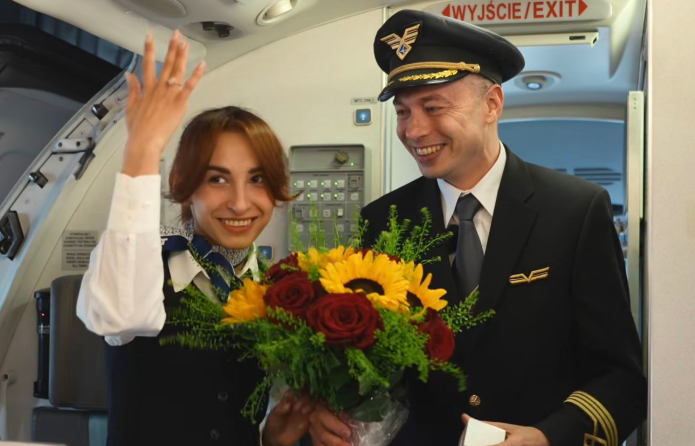
READ ALSO: FG To Pin Down Ways And Means To Tackle Inflation
“On today’s flight there is a very special person and I hope that she doesn’t expect anything,” he said.
“Ladies and gentlemen, about one and a half years ago in this job I met the most wonderful person that completely changed my life.
“You are most precious to me. You are my greatest dream come true. This is why I have to ask you a favour, honey.”

“Will you marry me?” he asked while getting down on one knee. His eyes swelled with tears as he waited patiently for his girlfriend’s answer, holding a bunch of flowers handed to him by a flight attendant.
Paula could be seen running down the aisle of the plane before leaping into the arms of her future husband.
“I don’t know if this is the right hand for this,” she laughed as she presented her hand for the ring.
READ ALSO: Obaseki Warns Against Open Grazing, Solicits Stakeholders’ Support
Passengers watched on in anticipation for her answer with one yelling, “Did she say yes?” to which the beaming captain responded: “She said yes!”
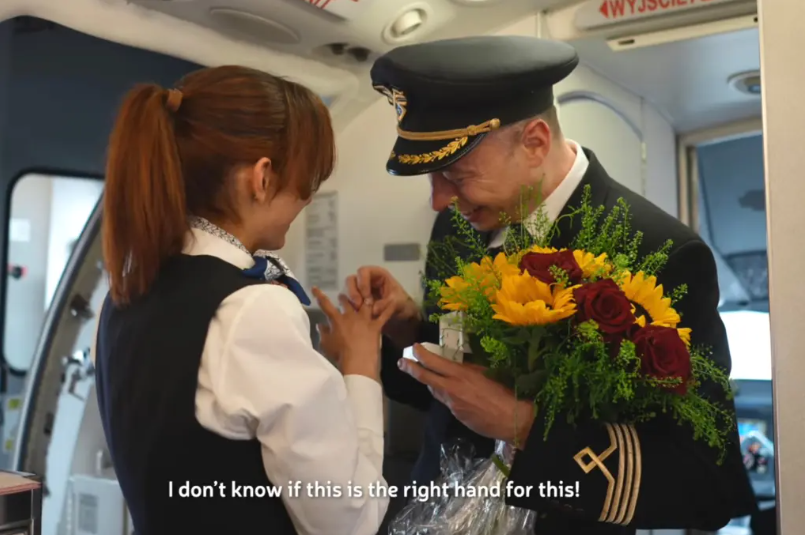
Pilot proposes to flight attendant girlfriend in front of passengers (video)
Hanc said the pair met on a flight to Krakow, a city in southern Poland near the border of the Czech Republic.
“This is why I want to propose on today’s flight to Krakow,” he said before popping the big question.
The video has gone viral with viewers leaving positive comments.
Watch the video below.
https://www.facebook.com/share/r/dwth2gn91EKiG1qg/?mibextid=oFDknk

How Flight Engineer Saved Us From Disaster — Ex-DG, Bureau of Public Service Reforms

JUST IN: Four-year-old Boy Dies In Abuja School, Parents Suspect Foul Play
JUST IN: 118 Inmates Escape As Rainstorm Destroys Niger Prison
Trending

 Entertainment3 days ago
Entertainment3 days agoBridesmaids’ Dance At Wedding Causes Stir On Social Media [VIDEO/PHOTOS]

 Politics4 days ago
Politics4 days agoEdo Guber: Akoko-Edo PDP Leaders Meet In Igara, Describe Ighodalo, Ogie As ‘Perfect Match’

 Metro3 days ago
Metro3 days agoVIDEO: ‘UNN Lecturer’ Caught Pants Down With Married Student

 News5 days ago
News5 days agoFoundation Advocates Empowerment Of Women, Youth In Nigeria

 News4 days ago
News4 days agoOutrage As Chinese Supermarket In Abuja Denies Nigerians Entry

 News5 days ago
News5 days agoJapa: Types Of US Visa Available To Nigerians, Other Foreigners

 News3 days ago
News3 days agoIGP, Jonathan Disagree Over State Police

 News5 days ago
News5 days agoJUST IN: Ondo Poll: Violence Breaks Out At APC Primary In Okitipupa

 News2 days ago
News2 days agoBREAKING: Dangote Further Crashes Diesel, Aviation Fuel Price

 Politics3 days ago
Politics3 days agoEdo Guber Final List : Group Knocks LP, Commends, INEC, Yakubu
